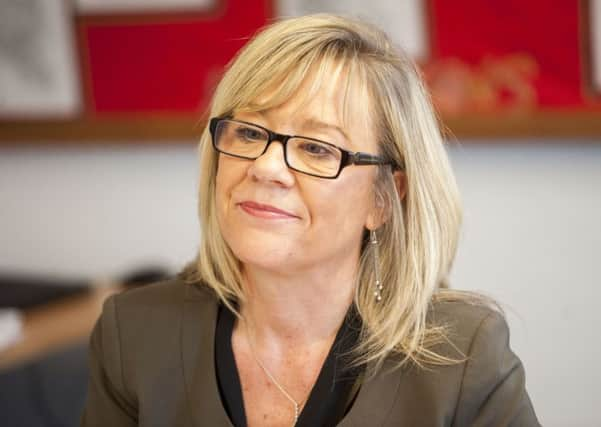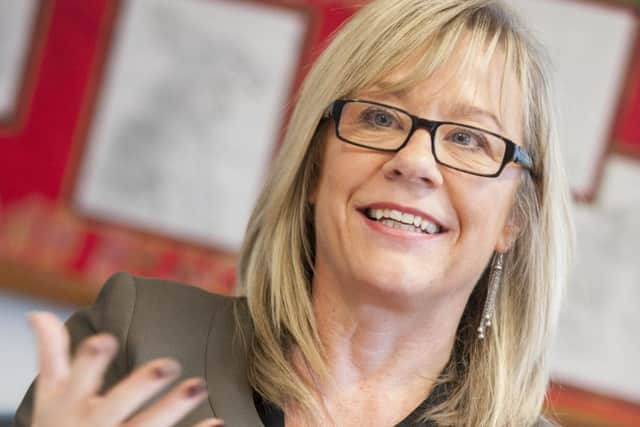fEATURE: How Jayne protects the city's youngsters


“They’re damned if they do and they’re damned if they don’t,” says Jayne Ludlam, explaining why Sheffield Council’s child protection workers face one of the authority’s hardest jobs on a daily basis, handling the city’s most troubled families.
“I feel responsible – and accountable. I think as a council we are their parents. These last few years we’ve had to really think about what we’re doing. We’ve lost up to 40 per cent of our budget. They call it austerity, but it’s been tough.”


Advertisement
Hide AdAdvertisement
Hide AdJayne is the executive director of the council’s children, young people and families department with around 4,500 staff encompassing a raft of services, from education to youth offending.
She admits her role is hectic. “You never know what you’re going to do from one day to the next. I can be talking child protection, I can be talking education, I can be talking schools or early years – that’s what makes it fantastic really.”
Jayne, who took up the £120,000-a-year post aged 48 in 2012, having been at the council for seven years, says her route to one of Sheffield’s top jobs has been ‘very strange’.
She grew up in Ecclesfield as the second-youngest of six children, and while training as an accountant decided to switch careers – “I didn’t get bored, but I thought there’s got to be something different” – to become a youth worker ‘in quite tough neighbourhoods’.


Advertisement
Hide AdAdvertisement
Hide AdAfterwards she returned to university and qualified as a social worker.
“What I found is that I started to change things wherever I went. Somehow that came with promotion, because people recognised ‘she’s got a good eye’ or ‘she’s handled that very well’.
“I think that’s how I arrived here. I’m very committed to Sheffield.”
One of her formative influences was the film Cathy Come Home – director Ken Loach’s unflinching, bleak portrayal of a mother who falls on hard times. In the harrowing final scene, her children are forcibly taken from her by council workers on a railway station platform.
Advertisement
Hide AdAdvertisement
Hide Ad“That made me think there’s got to be a better way of supporting families,” says Jayne, who has three grown-up sons with her partner and now lives in North East Derbyshire.
“A mum in that situation now we would support and find housing for. It has changed a lot – but it’s still difficult. There’s a concept of good enough parenting, which everybody’s got a view on.
“Our workers do understand the powers they have in relation to children and families, and I hope they use them very wisely and very well.”
She added: “What we try to do is support families right at the very beginning - at the earliest signs of trouble or struggle so we can stop them escalating.”
Advertisement
Hide AdAdvertisement
Hide AdThe department has introduced ‘multi-agency support teams’ in schools, where emotional health and wellbeing services are now offered.
“An adolescent is difficult enough to engage with, let alone taking them out of the places they go, so what we’ve tried to do is put services where children and young people go.
“It’s that age-old thing – if you intervene early you’ll stop problems later on. Prevention is always better than cure.”
Simply ensuring parents and children understand the value of education can be a challenge in itself, however.
Advertisement
Hide AdAdvertisement
Hide Ad“Sheffield’s faced some particular difficulties,” says Jayne.
“We’re in the middle of building new schools because there’s been a massive rise in the birth rate and we’ve been experiencing migration, so there’s lots more children needing school places now.
“And sometimes families can’t be in the same school. So that can create problems for attendance.
“But also it’s one of the safeguarding factors - if children are in school then you know they’re safe, or you hope they’re safe, because they’re attending school and people are seeing them.
Advertisement
Hide AdAdvertisement
Hide Ad“So it’s about their social development and their safety, but also their future. Education is the great liberator.
“It’s really hard because we’ve had cases where people take their children on holiday and think that’s OK. Well, it is OK if the rest of the academic year they’re at school.”
Jayne’s personal view on holidays in term-time is fair, but forthright: “Certainly in secondary school, don’t do it. Because that’s when their learning starts to develop, but also if you think about the early years, that’s when the most rapid progress is made.
“I understand when people do it. But it needs to be rare and not regular. You do have some sympathy because of the cost.”
Advertisement
Hide AdAdvertisement
Hide AdThe council plans to build two new secondary schools, both academies – one on the old Pye Bank School site in Pitsmoor, and the other in the south-west of the city, where the Bannerdale Centre once stood off Carterknowle Road.
But last month the Silverdale Multi-Academy Trust pulled out of an agreement to run the Bannerdale school, citing the ‘unacceptable financial risk’ involved.
“I think it’s a daunting task if it’s the first time you’ve become a multi-academy trust,” said Jayne.
“Also I think it’s a changing world. And there’s still a lack of clarity, I think, from the Government about the role of the local authority in education.
Advertisement
Hide AdAdvertisement
Hide Ad“I don’t think we’ve mastered that, and I think that is creating insecurity and confusion out there.”
Silverdale’s surprise decision was a ‘terrible shame’, Jayne said, and might cause the council to ‘rethink’ its programme, but she added: “We will continue, and we’ll still ensure where possible that we’ve got all the school places we need.”
The city’s not-for-profit improvement company Learn Sheffield - owned 80 per cent by schools and colleges, and 20 per cent by the council – was a way of driving up standards, Jayne continued.
“We’re really beginning to reap the benefits. For me, that’s the way to go - headteachers sharing best practice with each other.
“It’s really hard for headteachers at the moment.
Advertisement
Hide AdAdvertisement
Hide Ad“You’ve got rising expectations from parents, an incredibly robust inspection regime, and a fragmented education landscape – Ofsted, the local authority, and the regional schools commissioner.
“I think Ofsted would say ‘We’re very clear about what we expect’ – but I think it’s sometimes not in the context of how we’re experiencing day-to-day life.
“The Government isn’t always listening in quite the way it should. I can only hope we see a change now with Justine Greening as education secretary.”
The idea of new grammar schools has not found any favour with Jayne, though she readily accepts that any of Sheffield’s academies - which are outside local authority control - could convert to selective entry under the Government’s proposed policy.
Advertisement
Hide AdAdvertisement
Hide Ad“I remain unconvinced by the grammar school system, simply because there’s no evidence to support it works, really. It’s much more beneficial to parents to follow the same admission code.”
‘WE TRY TO OFFER SUPPORT & ENCOURAGEMENT’
Children are removed from their parents as ‘an absolute last resort’ in Sheffield, says Jayne Ludlam.
“The one thing that a child needs is a loving home. We would try to offer support and encouragement, and to work with the family.”
Some of the council’s most sensitive work involves dealing with the children of families caught up in crime, but Jayne warns against taking an ‘over-simplistic view’.
Advertisement
Hide AdAdvertisement
Hide Ad“Often families face tremendous difficulties that perhaps you and I wouldn’t want to experience, but actually love their children. So you have to be very careful. Not every adult who commits a crime then goes on to have children who do the same. Often that isn’t the case.”
She adds: “It’s about always protecting children, always protecting their future and protecting the people around them who are going to love and support them. It’s very few children who we do remove from parents - it’s a full assessment and it has to go through a full court process of 26 weeks, and a judge has to agree with us.
“Unfortunately some of the parents we work with have committed offences – but it doesn’t mean they’re bad parents.”